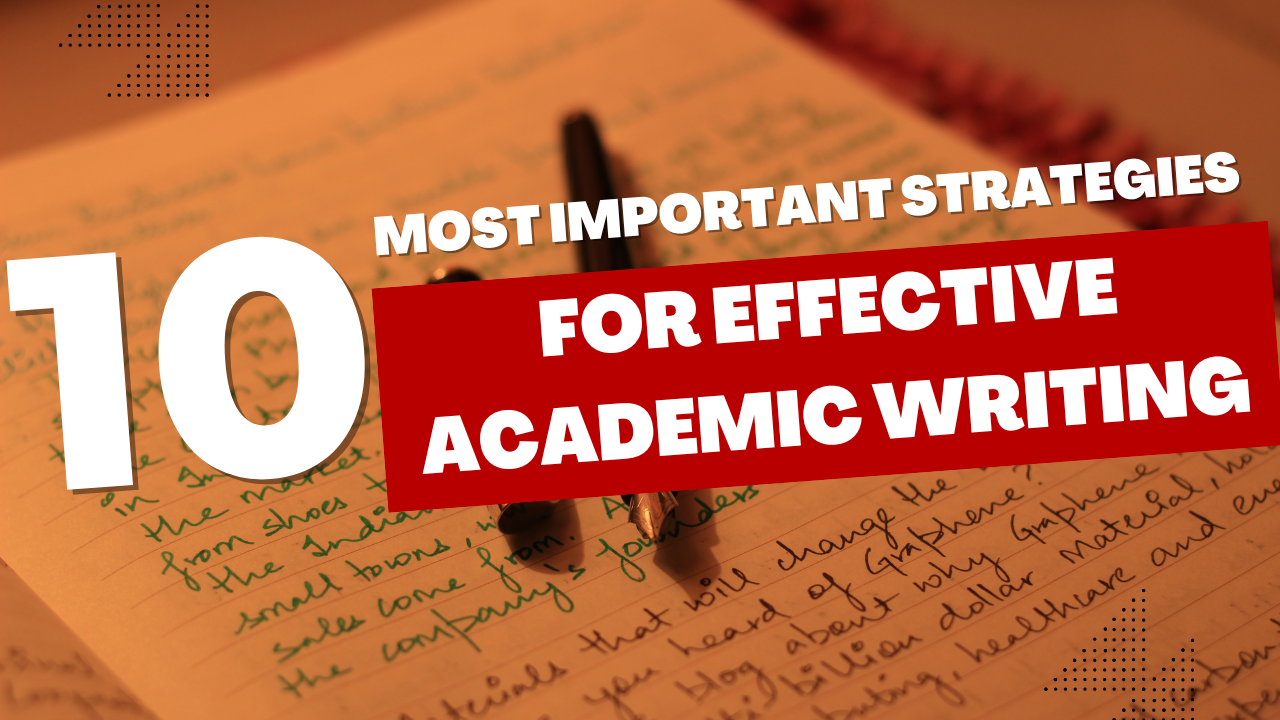Did you know that almost 2 million blog posts and academic articles hit the World Wide Web every day? It is a shocking amount of written content, and if you want to stand out in this crowded online world of academic writing, your work needs to be strong. Professional academic writers use specific strategies to make their writing look more polished and refined. Here is a breakdown of the ten most important strategies for improved and more effective academic writing.
10 Important Academic Writing Strategies
Prioritise Research
Before you start writing, you must first think about what you want to write about and why. Knowing the purpose of your writing is important for effective academic writing. For instance, if you are working on your thesis, it will be important to understand the topic of your thesis first and then craft an outline of the main points and structure your document. It will make the writing process tenfold smoother for you.
Conciseness
As they say that brevity is the soul of the conversation, in the same way, conciseness is the soul of a good academic document. Academic writing should be to-the-point and concise. It means you must avoid redundancy, repetition and adding unnecessary information to your academic document. Instead, you should ensure that each new sentence and paragraph reinforces your arguments in a certain situation and presents new information about it. You should also not include too much jargon in your custom papers.
Avoid Using Cliche Expressions
We use cliche expressions in our everyday lives, but when it comes to effective academic writing, you must avoid using such expressions as much as you can as they will lessen the impact of your work. Cliché expressions include several idioms, analogies, metaphors and figures of speech, such as ‘in a nutshell’, ‘think outside the box’ and so on. It will be best to keep flowery expressions and superfluous words out of your writing and keep your academic papers as understandable and easy as possible.
Avoid Using Informal Language
Academic writing should be purely objective, and you must avoid using slang words, colloquialisms and other informal expressions (unless you are tasked with writing a sociolinguistic report on the use of slang)! Such expressions are specific to a geographical region, historical period or language and are informal words and phrases used in specific contexts. So, while these speakers might be familiar to native speakers, they may not be familiar to the rest of your audience. It will be best to avoid using such informal expressions in your informal writing.
Using Topic and Transition Sentences
A topic sentence generally introduces the main concept of a particular section in your academic document. The importance of a topic sentence in setting the tone of your papers and presenting the central idea of the section cannot be denied. You must ensure that your topic sentences are refined and well-written for effective academic writing. Meanwhile, transition words also help you write more smoothly and prevent your work from sounding abrupt when you move from one paragraph or concept to another. Such sentences will maintain continuity with your arguments and create links between your thoughts and ideas.
Correct Formatting
Formatting plays a crucial role in effective academic writing. How your document is formatted depends on your referencing style and instructions set by your academic institution and department. Generally, you will be asked to use a 12-point serif typeface, mark the line spacing between 1.5 and 2.0 lines and leave a space between paragraphs rather than indenting the first line of each. You should also pay attention to how you format the headings, titles, tables, illustrations and graphs in your academic document to ensure your work is well-presented.
The Right Referencing Style
Each academic discipline has individual requirements for academic writing and has its preferred referencing style. For example, Education, Psychology and Sciences mostly use the APA (American Psychological Association) referencing style, while the Humanities department uses the MLA (Modern Language Association) referencing style. Each referencing system prefers different elements and dictates how information should be referenced and presented in an academic document. Following the right referencing style per your discipline and university requirements is necessary for effective academic writing.
Writing Multiple Drafts
When working on custom academic papers, you should write as many drafts as possible and not discard the previous ones. There is a reason why first drafts are called ‘rough drafts’ – they present a sketch of the final product. In the first step, you put your thoughts on paper and try to follow the outline while finding the space to fit all your ideas and research together. Once you are done making all the drafts, it will be time to start working on the final one. Your final academic draft must be coherent, logical and refined to fit the standards of effective academic writing.
Use a Timer
If academic writing is tough for you, writing in the timed intervals of focus will be better because it will yield more results. It will be best not to stop working on your project until the timer ends, as it will prevent you from being distracted by social media, text messages or other distractions. Also, ensure that you take short breaks while working so you do not get bored by the tiring writing process.
Editing and Proofreading
Edit, edit and edit your document until you cannot find anything else to edit and include in your paper! It is one of the most important steps to take before submitting your work and ensures effective academic writing. You can start the process by reading your writing out loud and noticing if there are any grammatical mistakes, incorrect punctuation, syntactic issues or jargon issues. You can also hire editing and proofreading services to proofread your papers and make them flawless and free from errors.
Conclusion:
We can conclude from the discussion above that effective academic writing can be learned and practised to achieve perfection in your written documents. It is a skill that takes time to master, and if you are determined enough, you can be excellent at writing the best academic articles or papers. Just be sure you practice the strategies mentioned in our blog, and you will be ready to excel with your best work!





Thank you for sharing wonderful information with us to get some idea about that content.
Thank you, Braulia for your comment
This excellent website really has all the info I needed about this subject and didn’t know who to ask.
Thank you Aisling for reading this blog
Thanks for sharing such as an amazing article.keep working … This is really very nice and it’s very helping for me..This post is unique and interesting ,thanks for sharing this awesome information
Thank you adelita
Gгeat рost, I believe people should acxquire a lot from this blog its real user pleasant. So mսch fantastic information on here
Thank You, Adina for your sharing your thought with us
Great post, informative blog. You cover a good topic of this era.
Thank You, Braulia your words a lot’s for our team